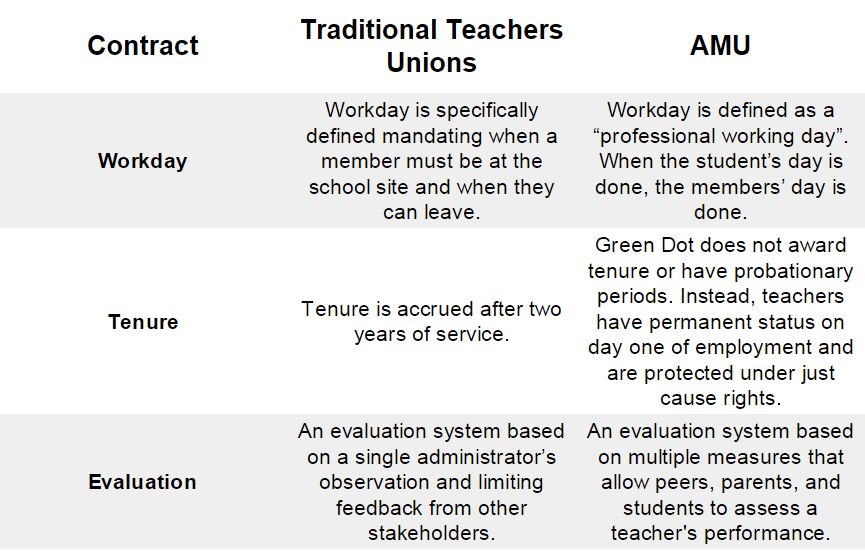A Different Kind of Teachers Union
(Image: Colin Lynch, History teacher at Animo Watts College Preparatory Academy)
Guest Post by Salina Joiner, AMU President
When people ask me what I do for a living, I explain to them that I’m an educator and the president of AMU, the Asociación de Maestros Unidos — the union that represents the teachers and counselors at Green Dot Public Schools California. Often they’re surprised to discover I work for a unionized charter school, and it usually leads to a discussion about unions in general: whether they’re good or bad, how they’ve evolved, and whether the negative images of them portrayed in the media are true.
My own path to union leadership was neither predetermined nor predictable. I wasn’t born and bred in the fundamentals of unionism; in college, I was an international relations major, focused primarily on human rights issues. I graduated with lofty dreams of working for the United Nations and fighting rebels in Sudan or Rwanda. I never imagined I’d be passionate about a cause much closer to home.
My earliest memory of unions stemmed from watching Norma Rae as a girl, never dreaming that years later, I’d be leading teachers and counselors as part of a new kind of union — one whose commitment to working through confrontation at both the upper management and the school-site level would be in service to the nation’s most underserved students.
Committed to Student Achievement
When people ask, I try to impress upon them that the AMU:
- doesn’t shy away from progressive ideas such as multiple measures for teacher and counselor evaluations
- believes it can positively impact the lives of students by collaborating with upper management and administrators
- keeps student achievement at the heart of what it does
Whatever their opinions about unions, most people are surprised to learn that AMU collaborates with management. What’s that like? they ask. I tell them it’s like any relationship: It takes work. Still, while it might seem easier to fight than figure out a way to work together, Green Dot and AMU are committed to collaboration for the long haul.
How does AMU differ from a traditional teachers union? Whereas a traditional union tends to focus mostly on wages, working conditions, and limiting what management can ask of teachers, a professional teachers union such as AMU focuses on building learning communities that help influence the teaching profession. It seeks to ensure that teacher leaders are given a voice in the development and implementation of instruction, curriculum design, assessments, and evaluation systems.
Collaboration and Evaluation
This isn’t to say that professional teachers unions don’t advocate for wages and workplace conditions; they do. They fight hard to ensure that teachers’ pay reflects the amount of time they put into their practice as educators. They also seek a broader range of collaborations, from an interest-based bargaining model and the opportunity to identify common interests, to joint decision-making and the value of all parties working together to achieve common goals.
How does AMU’s contract embrace the professional teachers union framework? Here’s a breakdown:
A New Model for a New Age
Other unions in the US are doing similar work: collaborating with management, addressing tenure issues, and creating multiple measures of evaluation. Every year, AMU members attend a conference with an organization called CALTurn, which focuses entirely on developing positive labor and management relations. The room is filled with unions from across the state that believe in many of the same tenets as AMU.
Throughout Green Dot’s 15-year history, its administration and AMU have maintained a respectful and collaborative relationship focused first and foremost on student success. That’s not changing anytime soon. Together we have negotiated a cooperative, collective bargaining agreement, one that’s both student-centered and supportive of our teachers.



